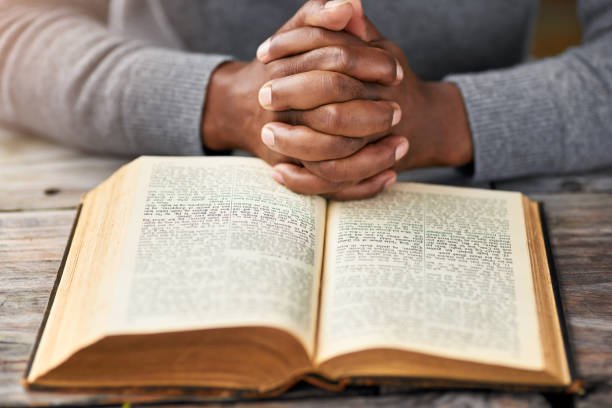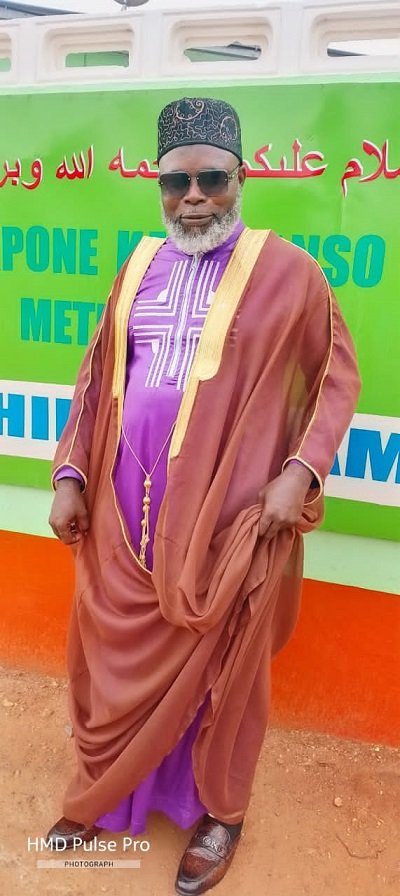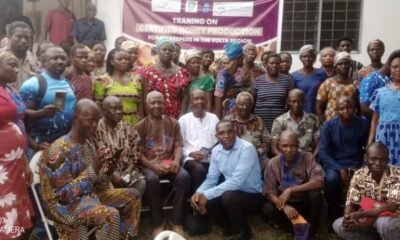Fruitful Living
Living the transformed life (Part 2)

High angle shot of an unrecognizable man reading his bible while sitting outside
For the grace of God has appeared that offers salvation to all people. It teaches us to say “No” to ungodliness and worldly passions, and to live self-controlled, upright and godly lives in this present age, while we wait for the blessed hope—the appearing of the glory of our great God and Saviour, Jesus Christ, who gave Himself for us to redeem us from all wickedness and to purify for Himself a people that are His very own, eager to do what is good. – Titus 2:11-14.
INTRODUCTION
The transformed life is a life that has been renewed to serve and fulfill God’s purpose for mankind. Living the transformed life is a process, a journey that we each embark on when we personally accept and invite Jesus Christ to become Saviour and Lord of our lives. What better way can we do this than by conducting ourselves as best as we can in the manner that Jesus Christ did while here on earth.
Let’s recap some principles we can practiSe to live a transformed life.
1. Live an exemplary life no matter where we are. (Philippians 2:15)
2. Eschew self-centredness by looking out for the interests for each other. (Philippians 2:4)
3. Don’t wait for the government to do everything. (James 2:14-16)
4. Stewardship requires faithfulness. (1 Corinthians 4:2)
5. Respect authority and national laws. (1 Peter 2:13-18)
6. Be content. (Hebrews 13:5)
7. Eschew idleness. (2 Thessalonians 3:10)
8. Pursue justice and fairness in all your dealings. (Colossians 4:1)
Most of these principles are not easy to follow especially if we find ourselves in the company of friends and/or fellow believers who have no sense of patriotism or people who have lost faith in Ghana’s ability to stand tall again. Nevertheless, there is hope because God’s grace is always sufficient and because with Him all things are possible. God empowers all those who are willing to do the right thing.
To overcome these realities that discourage us from conducting ourselves responsibly and responsively as Christian citizens in this nation, we need to remember:
- God has given us His Holy Spirit: With the help of the Holy Spirit, we can pray for our leaders at the workplace, in Parliament, and at the Presidency, even if we don’t feel like it or even if we don’t want to. The Holy Spirit is able to turn any disappointment and bitterness in our hearts against them into intercessory tears and prayers that are precious in the sight of God, and which can avail much for the nation. With the Holy Spirit we can work with excellence.
- God is watching us: The Bible tells us that the eyes of the Lord are in every place, keeping watch over good and evil. He sees and knows how you are wasting or productively using your employer’s paid time, resources, and opportunities you have been given. He sees and knows if and whether you sabotage your colleague, your supervisors and your employers. He sees and He knows if, how and when you deliberately underpay your workers, mistreat your workers, withhold their salaries unduly, etc. Maybe, from time to time we must play Bette Midler’s song ‘From A Distance’ to remind us about this.
- God has entrusted us with diverse gifts (Rom.12:6-8): Each of us carries a unique set of gifts, knowledge and experiences that no one else does. Some carry the grace to teach, others carry the grace to encourage/motivate others, while others are graced with the ability to lead, to give, and to show mercy (Rom.12:6-8). That is why we have been placed in different sectors of the economy and country to contribute in ways that no one else can. The Waakye Vendor can prepare delicious waakye that you can never successfully emulate no matter how beautiful or well-fitted your kitchen is. The Farmer has physical stamina and endurance that most people in the corporate sector can only wish for. The Engineer can build things that will make even the most respected medical doctor envious. The housewife can nurture and nourish her family in ways that the Corporate Woman may not have the opportunity to do. The Clergy can provoke the conscience and the gifting within their church members to spur them on to walk in entrepreneurship, accountability, integrity, and responsibility no matter what their professions or vocation may be. In short, we are different but let’s respect our differences, and use those differences to make a positive difference wherever we are. Indeed our differences should enrich us not destroy us.
- God determines the boundaries of where we live (Acts 17:26): There is a reason God allowed us to be born in Ghana and live in Ghana. Although this reason may not be clear to us (in fact we may never discover it), yet God expects us to make the most of our situation no matter what Ghana’s current circumstances are. He tells us in His word that if we are willing and obedient we will eat the good of the land (Isaiah 1:19). In other words, if we are willing and obedient to do what He tells us (that is, to pray for our leaders [1 Timothy 2:1-2], to seek the good of our leaders and our nation [Jeremiah 29:7]), He will surely cause us to enjoy the best that our nation can offer us. Proverbs 27:18 confirms this: ‘Whoever keeps the fig tree will eat its fruit;…’. This Scripture is simply telling us that we will partake of everything and anything we help to build. Therefore, if you and I contribute our quota to develop this nation, you can be sure that by God’s own divine mandate, we will prosper as this nation prospers.
Conclusion
As Christians, the power of God at work in us empowers us to live a transformed life can and will empower us to play our part in advancing the development of Ghana, our motherland.
We are therefore Society’s Asset. No wonder Proverbs 11:11 says that “Upright citizens are good for a city and make it prosper, but the talk of the wicked tears it apart.”
Every city has a mood, or perhaps an ethos, an attitude, or a culture. Whatever environment it has created for itself has enormous potential to shape the lives of its residents and form their perspectives. As much as we like to think we are independent individuals unaffected by the attitudes and decisions of the people around us, we are all part of a community. Our lives are interconnected.
That’s why Scripture tells us that upright citizens are good for a city and the negative talk can rip it apart. Our cities may not have the same dynamics as those in the ancient world when this proverb was written, but they are still built on relationships. A society filled with people who are invested, positive, constructive and dedicated to God’s ways will prosper, even when its citizens don’t understand why. A society filled with apathetic, negative, destructive, and amoral people will never have a short of problems. The differences between the two may not be readily apparent on the surface – prosperity takes different forms – but the long-term health of a culture stands or falls not on its majorities but on the level of involvement of its godly remnants. A little salt and light can have a huge effect on its surroundings.
As conventional as it sounds, God has called His people to be upright citizens. Society needs us to contribute our ethics and gifts to its well-being. Doing so puts us in a position of service and influence and seasons the whole culture. It’s one of the ways God extends His grace to this world and creates avenues for reaching others hearts and lives.
Let us never underestimate our significance as godly members of the society. We may think our contributions are unnoticeable, and we may never see tangible effects of our influence. But we are part of God’s Kingdom on earth that is never unimportant. Our city – or town or region – has its own atmosphere, and we have a hand in shaping it.
God bless our homeland Ghana and make it great and strong because we God’s children, Living The Transformed Life, are right here in this country.
Hymn: A Charge to Keep I Have – MHB 578
1 A charge to keep I have,
A God to glorify,
A never-dying soul to save,
And fit it for the sky.
2 To serve the present age,
My calling to fulfill;
O may it all my powers engage
To do my Master’s will!
3 Arm me with jealous care
As in Thy sight to live,
And O Thy servant, Lord, prepare
A strict account to give!
4 Help me to watch and pray,
And on Thyself rely,
Assured, if I my trust betray,
I shall for ever die.
Charles Wesley (1707-1778)
Stay blessed!
By Dr Joyce Aryee, the author
For further inquiries please contact us on Tel Nos. 0243588467 or 0268130615
Email: saltnlightministries@gmail.com
Website: saltandlightministriesgh.org
Fruitful Living
Eid-ul-Adha: A living legacy of faith, sacrifice, and devotion

We begin in the name of Allah, the Most Merciful, the Most Compassionate. We praise Him, seek His help and forgiveness, and seek refuge in Him from the evils of our souls and the wrongs of our actions.
May peace and blessings be upon the Prophet Muhammad (peace be upon him), his family, his noble companions, and all those who follow his path until the Day of Judgment.
Understanding the essence
of Eid-ul-Adha
Eid-ul-Adha, the Festival of Sacrifice, is one of the two major Islamic celebrations observed by Muslims across the world.
It commemorates the unwavering submission of Prophet Ibrahim (Abraham, peace be upon him) to Allah’s command when he was prepared to sacrifice his beloved son Isma’il (Ishmael, peace be upon him). Allah, in His infinite mercy, intervened and replaced the son with a ram, thus honouring Ibrahim’s sincerity and faith.
This moment of sacrifice is recorded in the Qur’an: “Then when they had both submitted and he put him down upon his forehead, We called out: ‘O Ibrahim! You have fulfilled the vision.’ Indeed, We thus reward the doers of good.” (Surah As-Saffat, 37:103–105)
This act of obedience is not merely a historical account. It is a living symbol that forms the essence of Eid-ul-Adha.
Ibrahim (A.S): The Architect
of Submission
Before the moment of sacrifice, Prophet Ibrahim and his family played critical roles in establishing Islam’s foundational pillars:
1. The building of the Ka‘bah
Prophet Ibrahim and his son Isma’il were chosen to construct the Ka‘bah, the sacred House of Allah in Makkah. The Qur’an records this noble moment:
“And [mention] when Ibrahim was raising the foundations of the House and [with him] Isma’il, [saying], ‘Our Lord, accept [this] from us. Indeed, You are the Hearing, the Knowing.’”
(Surah Al-Baqarah 2:127)
This structure remains the spiritual centre of Muslim worship, facing which over a billion Muslims direct their daily prayers.
2. The struggle of Hajar (Hajara) between Safa and Marwa
The mother of Isma’il, Hajar (Hajara), exemplifies a profound lesson of patience and faith. Left in the barren valley of Makkah with her infant, she ran between the hills of Safa and Marwa, desperately searching for water. Her perseverance was rewarded when the well of Zamzam sprang forth at the feet of her baby.
Her sincere struggle is now ritualised in Hajj as the Sa‘i between Safa and Marwa—a reminder of the role of women, the power of du‘a, and the value of trust in Allah’s provision.
Sacrifice at Mina and the
Rites of Jamarat
During Hajj, pilgrims reenact Ibrahim’s confrontation with Shaytan at Mina, where he rejected the devil’s temptation and cast stones at him. This act is now observed in Hajj as the ritual of stoning the Jamarat, symbolising the rejection of evil, temptation, and disobedience.
It is a vivid spiritual lesson: the path to Allah is one of resistance to distraction and sin, and one must be prepared to fight these forces with unwavering faith.
The essence of Arafat in Hajj
The Prophet Muhammad said:“Hajj is Arafah.” (Sunan al-Tirmidhi, 889)
Standing on the plain of Arafat, in deep humility and supplication, is the heart of Hajj. It represents the Day of Judgment, when all of humanity will stand before their Creator. The Prophet said: “There is no day on which Allah frees more people from the Fire than the Day of Arafah.” (Sahih Muslim, 1348)
For pilgrims, Arafat is a time of repentance, reflection, and renewal— and for non-pilgrims, fasting on that day is highly recommended.
Three core lessons from the
Sacrifice of Prophet Ibrahim
(A.S.)
1. Absolute obedience to Allah
Ibrahim’s willingness to sacrifice his son teaches that the essence of faith is unquestioning obedience to Allah. He prioritised divine command over emotion, logic, or comfort.
Takeaway:
In our lives, we must also be ready to put aside our desires, egos, and even attachments if they conflict with Allah’s instructions. This may involve sacrifices such as waking up for Fajr, staying away from haram income, or being truthful in difficult situations.
2. Sincere intention and inner sacrifice
The real essence of the sacrifice lies in the heart’s submission to Allah.
It is neither their meat nor their blood that reaches Allah, but it is your piety that reaches Him.”
(Surah Al-Hajj 22:37)
Takeaway:
Every act of worship should be grounded in sincerity. Whether it is prayer, charity, or sacrifice, what matters most is the purity of our intention.
3. Sacrifice for the greater good
The legacy of Eid-ul-Adha teaches us that sometimes, faith requires us to give up what we love for a greater purpose. Sacrificing wealth, time, or status in the path of Allah or for the benefit of others leads to spiritual elevation.
Takeaway:
Use your resources such as time, money, skills, for acts of benefit: support the poor, educate the young, assist the sick, and build your community.
Celebrating Eid-ul-Adha: A
Festival for all Muslims
Even for those who do not go on Hajj, Eid-ul-Adha holds immense significance. Muslims across the world participate in the act of Qurbani (sacrifice) to honor the tradition of Ibrahim (A.S.).
Types of animals and their
symbolism
Permissible animals include goats, sheep, cows, and camels. Each must meet a minimum age and be free of defects. The sacrificed animal is then divided into three parts: one for the family, one for relatives and friends, and one for the poor and needy.
This distribution reflects the spirit of sharing, compassion, and social responsibility—values at the heart of Islam.
The eternal message of Eid-ul-Adha
Eid-ul-Adha is not merely a celebration; it is a living tradition that calls us to:
• Submit like Ibrahim,
• Strive like Hajar,
• Sacrifice like Isma’il,
• Reflect like the pilgrims at Arafat.
May this Eid awaken within us a renewed commitment to obedience, sincerity, and compassion.
Let us make every Eid-ul-Adha a step forward in our spiritual journey, embodying the values of submission, sacrifice, and service to humanity. I wish every Muslim Eid Mubaarak
By Imaam Alhaji Saeed Abdulai
(Kpone Katamanso Metropolitan Chief Imaam)
Fruitful Living
Steps taken by government to combat illicit drugs (Final part)
The Minister for the Interior, Muntaka Mohammed-Mubarak, has reaffirmed the government’s commitment to combating drug abuse and illicit trafficking for a safer environment which would
go a long way to make Ghana a drug-free country. 3News.com (2025)
Solutions to Illicit Drugs from the Islamic perspective
are comprehensive and emphasise of both prevention and treatment:
Tarbiyah (Islamic nurturing): Instilling strong Islamic values from childhood through Qur’anic education, regular prayer, and association with righteous companions.
Community preaching (Da’wah): Imams must consistently raise awareness during khutbahs and Islamic programs about the dangers of drugs and the beauty of a sober, productive life.
Faith-based rehabilitation: Mosques and Islamic centers can partner with medical institutions to offer Qur’an therapy, spiritual counseling, and structured recovery programs.
Islamic youth clubs: Providing youth with halal entertainment, mentorship, and purposeful engagement can steer them away from harmful peer groups.
Zakat and Sadaqah: Channelling funds to support families of victims and establishing centres for rehabilitation.
Role of Parents, Society, Muslim Chiefs and Imams:
Parents must be vigilant and provide emotional support. A loving, nurturing home reduces a child’s vulnerability to drugs.
Society should de-stigmatize addiction. Drug users should be seen as patients needing healing, not criminals deserving rejection.
Muslim Chiefs must lead community campaigns, setting moral examples and supporting policy enforcement.
Imams must be more than religious leaders—they must become counsellors, educators, and advocates. Their leadership can shift public perception and guide collective action.
Conclusion
Illicit drugs pose one of the most dangerous threats to our society, undermining our religious values, harming our youth, and destroying our future. The Islamic position is clear and
Unequivocal: such substances are forbidden due to their destructive consequences on all aspects of life. Islam does not merely condemn the act but calls for a holistic response—spiritual, social, and structural.
As a society, particularly as Muslims, we must rise to confront this crisis with faith, compassion, and commitment. We must not only preach against drugs but actively work to rehabilitate victims, educate the next generation, and partner with public institutions to create a society of wellness and righteousness.
Recommendations
1. Introduce Islamic drug awareness education in madrasas and public schools, using Quran and Hadith-based materials to instill moral responsibility.
2. Create partnerships between the Ghana Narcotics Control Commission, Ghana Health Service, and Muslim organisations to develop culturally sensitive rehabilitation centres.
3. Train Imams and teachers in basic mental health and drug abuse counselling to serve as front-line responders in communities.
4. Utilise Friday sermons (khutbahs) nationwide to address the dangers of drug abuse periodically and provide practical steps for prevention.
5. Encourage community surveillance, where parents, chiefs, and youth groups report dealers and suspicious activities to the authorities.
6. Establish mentorship programmes in every Muslim community where successful, drug-free role models mentor youth.
7. Form interfaith coalitions, working across religious lines to tackle the drug menace as a national threat rather than a religious issue.
8. Provide job skills training for rehabilitated victims, helping them reintegrate into society and live dignified, self-sufficient lives.
By Imam Alhaji Saeed Abdulai, the Author







